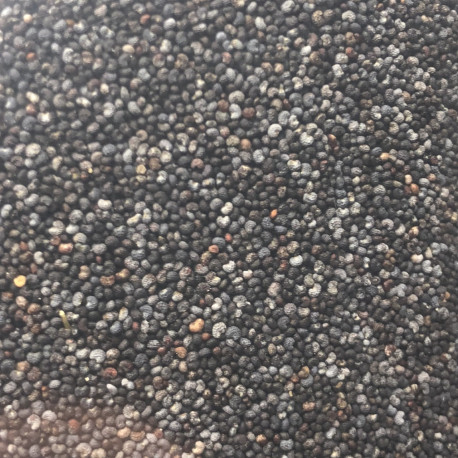





Reference: 160403-500G
Thanks to its small black or pretty electric blue seeds, the poppy is recognizable among thousands. A cousin of the poppy, the poppy is known for its content of good fats and micronutrients essential for the proper functioning of the body.
Thanks to its small black or pretty electric blue seeds, the poppy is recognizable among thousands. A cousin of the poppy, the poppy is known for its content of good fats and micronutrients essential for the proper functioning of the body.
Characteristics of the poppy:
Source of unsaturated fats;
Rich in iron;
Excellent source of vitamins and minerals;
Promotes cardiovascular health;
Regenerating properties.
Clover stimulates the immune system and slows down cellular ageing through its excellent antioxidant properties. Rich in vitamins B, C, E and provitamin A.
The turnipseed is quite similar to rapeseed, with the difference being the more bitter flavour of the latter. Turnipseed is rich in protein and beneficial for enhancing singing, making it particularly interesting during the breeding season for canaries. However, as this seed is quite fatty, we recommend not exceeding 10% of your mix with turnipseed for colour canaries or posture canaries. For song canaries, turnipseed softens the song and can therefore be used at 30% of the mix: in this latter case, we recommend accompanying your bird's diet with liver support.
Carrot seeds are very rich in vitamins with a high proportion of vitamin A and carotene, as well as vitamin B, calcium and valuable carbohydrates.
This seed from switchgrass is rich in protein (12.6%) it also contains 60% carbohydrates and less than 5% fat.
It is the richest variety of millet in protein. Japanese millet is recommended to all breeders of exotics, natives, parakeets, large parakeets.
Spinach seeds contain vitamins A, B1, B2, B3, B7, B9 and C, mineral salts and trace elements. Regular consumption helps to strengthen the feathers.
A 100% natural product that is mixed with breeding or with food; It doubles in size by adding water.
Carrots are very rich in vitamins with a high proportion of vitamin A and carotene, as well as vitamin B, calcium and valuable carbohydrates.
The sunflower seed contains nearly 40% lipids, but also proteins, carbohydrates, and vitamins B and E. A sunflower seed contains approximately 600 kilocalories per 100 g.
It meets the needs of a wide variety of birds throughout the year, including the smallest among them.
Sunflower seeds are a real treat for our birds who love them!
Onion seeds are rich in minerals, vitamins, and antioxidants.
Dari, also known as sorghum or millet, is a variety of grain that is related to millet varieties. Dari is the size of a hemp seed. The grain originates from the warm regions of Australia, Asia, Africa, and South America. There are three varieties: white dari, yellow dari, and reddish-brown dari. It is noteworthy that more value is attributed to light dari than to reddish-brown dari. Regarding nutritional value, there is not the slightest difference. Furthermore, reddish-brown dari is well appreciated by lovebirds. Dari can be compared to wheat in terms of starch content. The seed has a favourable composition of amino acids. The protein present in dari has a particularly high leucine content.
Rowan berry in dried fruit form, which hooked beaks, native birds, and tropical birds are fond of. Use it to enrich your seed mixes or as treats. Dried fruits have a very long shelf life. Use them daily and in every season for a balanced diet to avoid deficiencies.
Canary seed is a grass, an annual plant that can reach up to 1m in height, with seeds found in the inflorescences. These seeds make up a significant portion of most bird seed mixes.
• Excellent for canaries, European and exotic birds, budgerigars, and large parakeets.
• EXTRA canary seeds have undergone additional cleaning and are of exceptional quality. Unique on the market!
Peeled peanuts are treats highly appreciated by parrots.
They should be distributed sparingly as they are rich.
An ideal food to fill your feeders for wild birds, they will provide the necessary fat for birds to get through the winter more easily.
A favourite of tits and a real delicacy for many birds.
Flaxseed is composed of 40 to 45% oil and 25% protein. Flaxseed keeps very well. In particular, it contains two fatty acids with similar names (and whose root is the word "flax"), linolenic acid (an omega 3) and linoleic acid.
The seed is used in animal feed, especially for laying hens whose omega 3 content is to be increased.
Through these properties, this seed promotes digestion.
Buckwheat is a seed that is very low in fat but rich in carbohydrates. This seed is ideal for feeding show finches and European birds.
Clover stimulates the immune system and slows down cellular ageing through its excellent antioxidant properties. Rich in vitamins B, C, E and provitamin A.

Thanks to its small black or pretty electric blue seeds, the poppy is recognizable among thousands. A cousin of the poppy, the poppy is known for its content of good fats and micronutrients essential for the proper functioning of the body.
